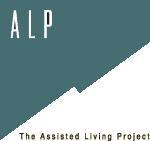WHY ALP WAS FORMED
The Assisted Living Project (ALP) was initially created because there were no appropriate places for young adults with traumatic brain injuries to live. Typically they have the options of living in a nursing home or perhaps living with family members who may not be prepared to adequately address their needs.
In the spring of 1996, Jody Cramer’s son Michael, who had acquired a serious brain injury in an auto accident, was due to be discharged from a rehabilitation center. Jody found herself faced with the dilemma of where to have Michael live so that his needs would be met. During this time, Crystal Dunniway’s daughter Michelle was being ‘warehoused’ in a nursing home while she too searched for an appropriate placement. After much travail, Attorney Robert Ludlow, social worker Cheryl Bentley; and Dr. Stephan Bennett, along with Jody and Crystal formed a team and decided to rent a house for Michael and Michelle to share. Dr. Bennett’s family foundation offered a $10,000 grant, and with additional seed money provided by Adaptec and Gordon &TJ Bethune, the group made a big leap into uncharted waters. In July 1996, the ‘Mission House’ was established.
The house provided an independent living situation for not only Michael and Michelle, but also two other young adults with brain injuries. A young married couple agreed to live there and do some housekeeping and cook dinners. This helped add a warm family atmosphere.
In December of 1999, ALP received a second, very generous, grant of $250,000. from Gordon Bethune, making it possible to purchase a beautiful home in Scotts Valley. This lovely residence, known as the Glenwood House, is now home to five men with disabilities. It has a beautiful yard and is close to shopping and a bus stop.
Glenwood has become a place where people care about each other, eat together, celebrate together, laugh and cry together. Every person who has lived there has had their condition improve!
NON-PROFIT STATUS
Soon after the Mission House was up and running the team applied for 501(c)(3) status in order receive donations to help with expenses not being covered by the residents rent.
From the inception of the organization, the ALP board has always believed that any homes that were established should function simply as people living together. . .not formal, licensed facilities. Because most of the residents receive only Social Security benefits and have little or no other money, shared living is their only option if they want to avoid living in institutions. Since only licensed institutions can receive government funds, ALP must raise a substantial amount of money each month to subsidize the mortgage, maintain the home, and cover the high costs of insurance. In addition to administering the Glenwood House, ALP is concerned about increasing the community’s awareness of brain injury issues and the lack of affordable housing and home care.
VERY FEW OPTIONS
Every year thousands of people become permanently disabled. Once they are medically stable they are usually discharged to institutions funded by the government, or they move back home with their families.
Until today’s government and private health insurance programs address the need for affordable, comprehensive home health care, the current medical model of health services for people with severe disabilities will continue to prevent, rather than encourage, quality of life. Although government agencies are willing to use tax dollars to pay the high price of keeping such individuals institutionalized for a lifetime, they seem unwilling to cover adequate home care—a more affordable and humane option.
